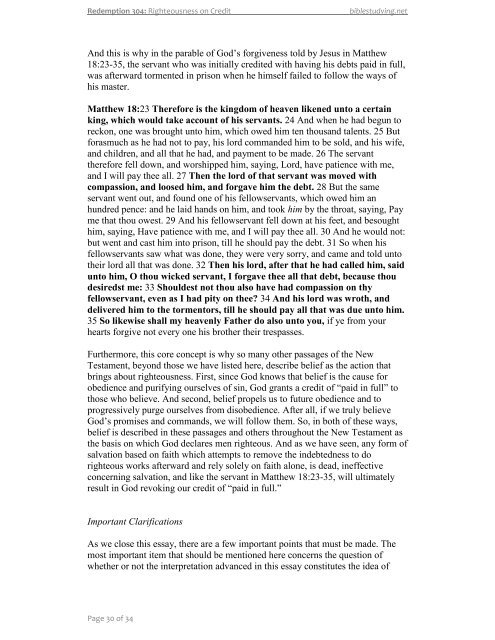righteousness-credit
righteousness-credit
righteousness-credit
Create successful ePaper yourself
Turn your PDF publications into a flip-book with our unique Google optimized e-Paper software.
Redemption 304: Righteousness on Credit<br />
biblestudying.net<br />
And this is why in the parable of God’s forgiveness told by Jesus in Matthew<br />
18:23-35, the servant who was initially <strong>credit</strong>ed with having his debts paid in full,<br />
was afterward tormented in prison when he himself failed to follow the ways of<br />
his master.<br />
Matthew 18:23 Therefore is the kingdom of heaven likened unto a certain<br />
king, which would take account of his servants. 24 And when he had begun to<br />
reckon, one was brought unto him, which owed him ten thousand talents. 25 But<br />
forasmuch as he had not to pay, his lord commanded him to be sold, and his wife,<br />
and children, and all that he had, and payment to be made. 26 The servant<br />
therefore fell down, and worshipped him, saying, Lord, have patience with me,<br />
and I will pay thee all. 27 Then the lord of that servant was moved with<br />
compassion, and loosed him, and forgave him the debt. 28 But the same<br />
servant went out, and found one of his fellowservants, which owed him an<br />
hundred pence: and he laid hands on him, and took him by the throat, saying, Pay<br />
me that thou owest. 29 And his fellowservant fell down at his feet, and besought<br />
him, saying, Have patience with me, and I will pay thee all. 30 And he would not:<br />
but went and cast him into prison, till he should pay the debt. 31 So when his<br />
fellowservants saw what was done, they were very sorry, and came and told unto<br />
their lord all that was done. 32 Then his lord, after that he had called him, said<br />
unto him, O thou wicked servant, I forgave thee all that debt, because thou<br />
desiredst me: 33 Shouldest not thou also have had compassion on thy<br />
fellowservant, even as I had pity on thee? 34 And his lord was wroth, and<br />
delivered him to the tormentors, till he should pay all that was due unto him.<br />
35 So likewise shall my heavenly Father do also unto you, if ye from your<br />
hearts forgive not every one his brother their trespasses.<br />
Furthermore, this core concept is why so many other passages of the New<br />
Testament, beyond those we have listed here, describe belief as the action that<br />
brings about <strong>righteousness</strong>. First, since God knows that belief is the cause for<br />
obedience and purifying ourselves of sin, God grants a <strong>credit</strong> of “paid in full” to<br />
those who believe. And second, belief propels us to future obedience and to<br />
progressively purge ourselves from disobedience. After all, if we truly believe<br />
God’s promises and commands, we will follow them. So, in both of these ways,<br />
belief is described in these passages and others throughout the New Testament as<br />
the basis on which God declares men righteous. And as we have seen, any form of<br />
salvation based on faith which attempts to remove the indebtedness to do<br />
righteous works afterward and rely solely on faith alone, is dead, ineffective<br />
concerning salvation, and like the servant in Matthew 18:23-35, will ultimately<br />
result in God revoking our <strong>credit</strong> of “paid in full.”<br />
Important Clarifications<br />
As we close this essay, there are a few important points that must be made. The<br />
most important item that should be mentioned here concerns the question of<br />
whether or not the interpretation advanced in this essay constitutes the idea of<br />
Page 30 of 34


